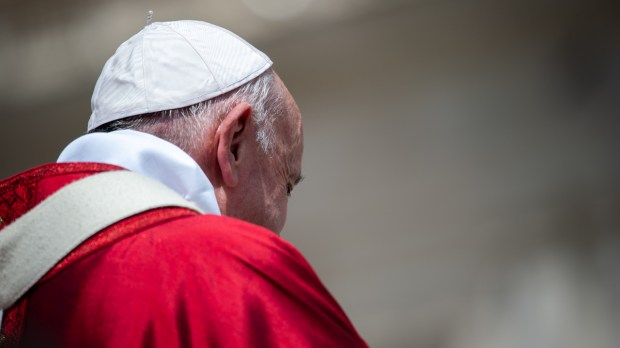Here is a Vatican translation of the full text of his homily:
~
“When the Paraclete comes, whom I will send to you from the Father…” (Jn 15:26). With these words, Jesus promises to send his disciples the Holy Spirit, the ultimate gift, the gift of gifts. He uses an unusual and mysterious word to describe the Spirit: Paraclete. Today let us reflect on this word, which is not easy to translate, for it has a number of meanings. Essentially, it means two things: Comforter and Advocate.
The Paraclete is the Comforter. All of us, particularly at times of difficulty like those we are presently experiencing due to the pandemic, look for consolation. Often, though, we turn only to earthly comforts, ephemeral comforts that quickly fade. Today, Jesus offers us heavenly comfort, the Holy Spirit, who is “of comforters the best” (Sequence). What is the difference? The comforts of the world are like a pain reliever: they can give momentary relief, but not cure the illness we carry deep within. They can soothe us, but not heal us at the core. They work on the surface, on the level of the senses, but hardly touch our hearts. Only someone who makes us feel loved for who we are can give peace to our hearts. The Holy Spirit, the love of God, does precisely that. He comes down within us; as the Spirit, he acts in our spirit. He comes down “within the heart”, as “the soul’s most welcome guest” (ibid). He is the very love of God, who does not abandon us; for being present to those who are alone is itself a source of comfort.
Only someone who makes us feel loved for who we are can give peace to our hearts. The Holy Spirit, the love of God, does precisely that.
Dear sister, dear brother, if you feel the darkness of solitude, if you feel that an obstacle within you blocks the way to hope, if your heart has a festering wound, if you can see no way out, then open your heart to the Holy Spirit. Saint Bonaventure tells us that, “where the trials are greater, he brings greater comfort, not like the world, which comforts and flatters us when things go well, but derides and condemns us when they do not” (Homily in the Octave of the Ascension). That is what the world does, that is especially what the hostile spirit, the devil, does. First, he flatters us and makes us feel invincible (for the blandishments of the devil feed our vanity); then he flings us down and makes us feel that we are failures. He toys with us. He does everything to cast us down, whereas the Spirit of the risen Lord wants to raise us up. Look at the apostles: they were alone that morning, alone and bewildered, cowering behind closed doors, living in fear and overwhelmed by their weaknesses, failings and their sins, for they had denied Christ. The years they had spent with Jesus had not changed them: they were no different than they had been. Then, they received the Spirit and everything changed: the problems and failings remained, yet they were no longer afraid of those them, nor of any who would be hostile to them. They sensed comfort within and they wanted to overflow with the comfort of God. Before, they were fearful; now their only fear was that of not testifying to the love they had received. Jesus had foretold this: “[The Spirit] will testify on my behalf; you also are to testify” (Jn 15:26-27).
Let us go another step. We too are called to testify in the Holy Spirit, to become paracletes, comforters. The Spirit is asking us to embody the comfort he brings. How can we do this? Not by making great speeches, but by drawing near to others. Not with trite words, but with prayer and closeness. Let us remember that closeness, compassion and tenderness are God’s “trademark”, always. The Paraclete is telling the Church that today is the time for comforting. It is more the time for joyfully proclaiming the Gospel than for combatting paganism. It is the time for bringing the joy of the Risen Lord, not for lamenting the drama of secularization. It is the time for pouring out love upon the world, yet not embracing worldliness. It is more the time for testifying to mercy, than for inculcating rules and regulations. It is the time of the Paraclete! It is the time of freedom of heart, in the Paraclete.
The Paraclete is telling the Church that today is the time for comforting.
The Paraclete is also the Advocate. In Jesus’ day, advocates did not do what they do today: rather than speaking in the place of defendants, they simply stood next to them and suggested arguments they could use in their own defence. That is what the Paraclete does, for he is “the spirit of truth” (v. 26). He does not take our place, but defends us from the deceits of evil by inspiring thoughts and feelings. He does so discreetly, without forcing us: he proposes but does not impose. The spirit of deceit, the evil one, does the opposite: he tries to force us; he wants to make us think that we must always yield to the allure and the promptings of vice. Let us try to accept three suggestions that are typical of the Paraclete, our Advocate. They are three fundamental antidotes to three temptations that today are so widespread.
The first advice offered by the Holy Spirit is, “Live in the present”. The present, not the past or the future. The Paraclete affirms the primacy of today, against the temptation to let ourselves be paralyzed by rancour or memories of the past, or by uncertainty or fear about the future. The Spirit reminds us of the grace of the present moment. There is no better time for us: now, here and now, is the one and only time to do good, to make our life a gift. Let us live in the present!
The Spirit also tells us, “Look to the whole”. The whole, not the part. The Spirit does not mould isolated individuals, but shapes us into a Church in the wide variety of our charisms, into a unity that is never uniformity. The Paraclete affirms the primacy of the whole. There, in the whole, in the community, the Spirit prefers to work and to bring newness. Let us look at the apostles. They were all quite different. They included, for example, Matthew, a tax collector who collaborated with the Romans, and Simon called the zealot, who fought them. They had contrary political ideas, different visions of the world. Yet once they received the Spirit, they learned to give primacy not to their human viewpoints but to the “whole” that is God’s plan. Today, if we listen to the Spirit, we will not be concerned with conservatives and progressives, traditionalists and innovators, right and left. When those become our criteria, then the Church has forgotten the Spirit. The Paraclete impels us to unity, to concord, to the harmony of diversity. He makes us see ourselves as parts of the same body, brothers and sisters of one another. Let us look to the whole! The enemy wants diversity to become opposition and so he makes them become ideologies. Say no to ideologies, yes to the whole.
Today, if we listen to the Spirit, we will not be concerned with conservatives and progressives, traditionalists and innovators, right and left. When those become our criteria, then the Church has forgotten the Spirit.
The third advice of the Spirit is, “Put God before yourself”. This is the decisive step in the spiritual life, which is not the sum of our own merits and achievements, but a humble openness to God. The Spirit affirms the primacy of grace. Only by emptying ourselves, do we leave room for the Lord; only by giving ourselves to him, do we find ourselves; only by becoming poor in spirit, do we become rich in the Holy Spirit. This is also true of the Church. We save no one, not even ourselves, by our own efforts. If we give priority to our own projects, our structures, our plans for reform, we will be concerned only about effectiveness, efficiency, we will think only in horizontal terms and, as a result, we will bear no fruit. An “-ism” is an ideology that divides and separates. The Church is human, but it is not merely a human organization, it is the temple of the Holy Spirit. Jesus brought the fire of the Spirit to the earth and the Church is reformed by the anointing of grace, the gratuity of the anointing of grace, the power of prayer, the joy of mission and the disarming beauty of poverty. Let us put God in first place!
Holy Spirit, Paraclete Spirit, comfort our hearts. Make us missionaries of your comfort, paracletes of your mercy before the world. Our Advocate, sweet counsellor of the soul, make us witnesses of the “today” of God, prophets of unity for the Church and humanity, and apostles grounded in your grace, which creates and renews all things. Amen.


